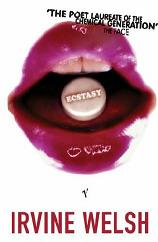I've tried to love second-hand books. I really have. But it's a relationship fraught with crumbs.
It's not that I have no experience of pre-loved books. In the days before op-shopping was trendy, my mum was the mistress of the bargain. Of course, they were also the days when one could still pick up cashmere jumpers for 50 cents and desginer boots for a dollar. Novels were usually 10 cents each, so she'd come home with 10 at a time.
But only if they were clean.
I've inherited this fastidiousness when it comes to books. I just can't help it. Every time I think, "I really should get over this silly prejudice of mine," and start to browse in the book stall in the Central Market, I find a book that I want.
Out of Africa, for instance, or
A Passage to India. "Hmm, the cover looks OK," I think, eyeing off the $2 price tag. Bargain!
But invariably I open it and find preserved between its pages
(a) a slice of bacon;
(b) a large, fleshy, very flat moth; or
(c) crumbs.
I have no problem with using heavy books to press flowers. After all, it was the only thing I used the family Bible for when I was a kid. But I can only presume that the previous owners of these volumes had no bookmarks, no fly swats, a shortage of plates or all of the above. Hey presto, I drop the book back on the pile and wipe my hands on my jeans. Ford knows what else is on them!
Yes, I probably am a little OCD. I know. It's just that I like to read in bed and my bed is my temple. I don't even like to take library books into it.
And yes, I'm one of those people who goes into small fits of apoplexy over those dirty bastards who take communal newspapers into the toilet. After all, at some point, they have to put it on a potentially pee-besmirched floor. And if they aren't putting them down, then that's even worse.
About five years ago, before I was a half-hearted hack, I had a boss whom I hated even more than celery. Let's call him Boofhead, because he was. One of my daily jobs was the office media monitoring, clipping relevant stories from the newspapers to put into a folder for future reference. I'd done this peacefully for some years with my old boss, but when Boof arrived, the papers suddenly became... distasteful.
He would wander out of his office about 10 every morning, fetch up the paper and head for the men's. Twenty-five minutes later, the door would bang, he would reappear and he'd DROP THE PAPER IN MY IN-TRAY. After a few days of this, I fronted him up and said that if he was going to take the paper into the dunny, he could clip it himself because I would not be touching it. Being a lazy little swine, he had no intention of doing his own clippings, so he refrained ~hallelujah, angels blowing trumpets, etc.~
I'm also a little fussy about who I lend my books to. A uni friend borrowed my copy of
Cloud Street some years ago. It was the edition with the nice cover, showing a terrace house. A few weeks later, she said, "Oh, you know your copy of
Cloud Street." Er, yes? My current favourite book, you mean? "Yes, that's the one! Well, I dropped it in the bath." You dropped it in the
what?! "Yes, it slipped. Anyway, I dried it with the hairdrier and it's almost as good as new. Well, the pages
are a bit wavey. But you don't want me to buy you a new copy, do you?" DO I,
FUCK! "Oh well, I wanted a copy myself anyway."
So, if you ask to borrow one of my books, you can expect me to ask whether you are a Chewer of Books. Do you dog-ear? Do you break their poor dear backs by leaving them open for days at a time? Do you leave them on the lawn or take them to the tropics? Do you shred dust jackets on hard covered books? Do you allow kittens to sharpen their claws on them? Do you borrow a book and keep it for the better part of a year? Are you, in short, no respecter of the printed word? Because if you aren't, you may get one of my books, but you'll never get a second.
Oh, bugger off. No, I wasn't an only child and I have no problem with sharing unless the sharee is the equivalent of a demolition ball crossed with the Myth Buster boys and a flame-thrower. Books are sacred, damn you!
Unless they're Bryce Courteney, Jackie Collins or VC Andrews. If they're pulp fiction, you can use 'em for barbecue kindling for all I care.
 Will Cooper’s story begins as old man.
Will Cooper’s story begins as old man. 
 Mister Pip, Lloyd Jones, Text Publishing, $29.99
Mister Pip, Lloyd Jones, Text Publishing, $29.99

 Orpheus Lost, Janette Turner Hospital, Harper Collins, $29.95
Orpheus Lost, Janette Turner Hospital, Harper Collins, $29.95

